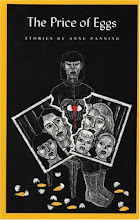
At first I was reluctant. I remember my students telling me a couple years ago about the wonders of Facebook, and me saying, “Yeah, but why can’t you just send your friends email?”
“But no!” they said. “Just try it. It’s all under one roof. You’ll see!”
And oh. Oh-ho, yes. It didn’t take long—old high school friends, college roommates, relatives, acquaintances, current and former students, writers, colleagues—all under my own blue and white roof. I was smitten. Fun! In touch with so many long-lost friends all over the globe. Caught up with people I hardly ever see. It was magical.
It may have been one of the worst decisions I’ve ever made.
Let me explain.
1. I have never had a good shut-off mechanism. If I want to buy a coffee table, say, I will search online for days, weeks, late into the night, obsessively, trying to nail down the exact right one. I cannot let it go. I cannot stop the hunt. So, too, with Facebook.
2. Sometimes I’m more concerned with what to write for my status update than I am with my current book-in-progress (and I have heard this from other writers, too).
3. I have seen newborn babies ushered into the world, celebrated a friend's successful surgery, even followed a couple day by day on their honeymoon via Facebook. It is neither good nor bad to witness these things. In fact, I find it quite compelling and can’t get enough (see #1). But by tearing the mask of privacy off these life-marking moments, I am often left oversaturated yet oddly underfed. I don’t know where to go next, what to think, how to respond. More importantly, in the shadow of all these significant moments, I often find my own life to be lacking. In fact, Facebook has made me very dissatisfied, uncertain and confused about my life. In reading so often about other peoples’ lives that make them sound witty and wonderful and adventurous and generous and creative, there is a dark sense of competitive doom, a gnawing anxiety that my own life will never be enough. As much connection, friendship and pleasure I’ve experienced on Facebook, there has been just as much envy, longing, and loneliness. It makes sense to me why so many people, at one point or another, publicly announce, on Facebook, that they’re taking a break from Facebook. It’s simply too much; it can become damaging to our mental health and well being.
Below, some examples of Facebook's negative effects on my life:
1. An old friend of mine, L, seems to spend so much more time with her two little kids than I do with mine. Plus, she’s remodeling their rooms so cutely and they wear really expensive and cool Hanna Andersson clothes. I’M SELFISH AND DON’T CARE ENOUGH ABOUT MY KIDS OR HOUSE.
2. How could T, who just had a baby, be writing again already? I’M LAZY.
3. How does N know so much about wine? I’M A YAHOO.
4. So Ms. P started running suddenly and lost tons of weight and now wears a size 4? MY STOMACH IS DOUGHY.
5. So this family does nothing but travel all over the country and camp in a tent in gorgeous state parks? BROCKPORT SUCKS.
6. My sister hosted a huge Christmas dinner with 25 relatives at her house. WE ARE ALWAYS ALONE.
7. One of my friends, J, thanks another friend, M, for the great time she had at their party. WHY WASN'T I INVITED?
8. Friend G has been out digging in her garden all day. I LIVE IN MY HEAD.
These are admittedly petty, small-minded and short-lived reactions. But here’s the thing: how many of these posts are accurate portrayals of lives lived? Not many, of course. What's hard to remember is they're just excerpts, incomplete moments polished and shined for the public. Don't get me wrong; I'm not saying anyone is out-and-out lying in their Facebook posts, but just as when a photographer takes a picture, there is a choice made between what to put in and what to leave out. It reminds me of when me and my husband and two kids lived in Vietnam and kept a blog. Looking back through the postings and pictures later, I was amazed by how fun it all looked, how exciting, how many smiles & swimming pools & gorgeous sunsets there were. What wasn’t included, of course, were the long hours and days spent holed up in the only room with air conditioning, simply getting through the days. What wasn’t included was how, in the absence of friends or a support network, I felt my depression creeping up on me again, threatening to throw a wet blanket over my mood. What wasn’t included were the many long nights Mark and I would sit outside in the ungodly heat drinking warm beer, slapping mosquitoes on our legs, hoping we wouldn’t get malaria.
Facebook, of course, is the same, although I’ve noticed that when someone does write, “I’m sad today,” there is a general supportive rallying, a rushing to aid the person in need that I actually find quite moving. But it isn’t very common. Mostly we show off a little or amplify the actual experience lived. I remember last Christmas standing on a kitchen chair, photographing some beautiful pink frosted cookies I’d made. I took over 10 shots just to get them exactly right. Then, I posted them on Facebook, and waited for numerous responses that eventually came flooding in. What no one knew was how awful the cookies tasted and how I ended up throwing them out. What no one knew was how making the cookies brought back the grief of my mother's death so sharply that I ended up clutching the kitchen counter and sobbing until my head hurt.
If we all posted truly honest status updates, it would be too worrisome, too raw; we would end up scaring each other—thus, the fiction. The fabrication of our Facebook lives is necessary and understandable, but it can also unsettle with its false bravado, its embellished cheer, its manufactured candor.


.jpg)